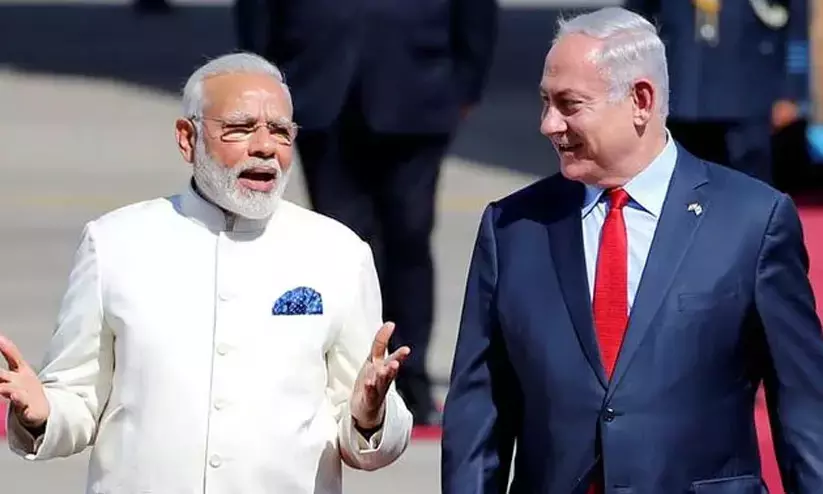
The prospects of Israel in opening a new war front as Iran joins the fight
text_fieldsWith Iran launching ballistic missiles, which is surreptitiously considered by Israelis as Iran’s declaration of war, the challenges posed for Israel cannot be ascertained at this stage, given the previous setbacks faced from Hezbollah following its ground invasions of Lebanon; however, well-equipped both are by military and intelligence capabilities.
Israeli military operation comes almost two decades after the 2006 Lebanon War, which resulted in significant casualties and a contentious outcome for the Israeli military. The latest developments suggest that Israel may be facing similar challenges and strategic dilemmas as it seeks to achieve its objectives in a region marked by complexity and entrenched hostilities.
The 2006 conflict, characterised by fierce fighting and operational failures, saw Israel unable to secure a decisive military victory despite its advanced capabilities. The government-commissioned Winograd Commission concluded that Israel's actions led to a prolonged war without clear success.
At least 121 Israeli soldiers lost their lives, and significant damage was inflicted on Israeli military assets, including the destruction of over 20 tanks. This past failure serves as a backdrop for the current military operation, which Israel describes as "limited, localised and targeted."
However, early evidence from the ground indicates that Israel may be gearing up for a more extensive campaign. The mobilization of troops and equipment suggests a possible intention to engage in a prolonged conflict, contrary to official statements. Hezbollah has already reacted aggressively, launching rockets into northern Israel and further escalating the situation.
The humanitarian impact of these exchanges has been severe, with around 60,000 residents in northern Israel displaced due to Hezbollah’s bombardment. In Lebanon, Israeli missile strikes over the past year have also displaced over 100,000 individuals, with a significant increase in displacement following intensified Israeli airstrikes.
Israeli Prime Minister Benjamin Netanyahu has set ambitious goals for the current operation, seeking to neutralise Hezbollah’s threat and facilitate the safe return of displaced Israelis to northern communities. Yet, analysts caution that the Israeli government may be underestimating Hezbollah's resilience and combat capabilities. Unlike in 2006, where Israel's military action was somewhat reactive, the current strategy appears to be more deliberate, indicating lessons learned from past conflicts.
The Israeli military has deployed elite units, including the 7th Armored Brigade and the 98th Division, which have recently engaged in combat in Gaza. This operational readiness is emphasised by Israeli army officials, who have asserted that their forces are better prepared and more experienced than Hezbollah's fighters. The Israeli military is also relying on enhanced intelligence capabilities, including surveillance drones, to monitor and counter Hezbollah’s movements and potential ambushes.
Hezbollah, on the other hand, has not remained idle. The group has significantly expanded its military capabilities since 2006, increasing its number of fighters and enhancing its arsenal, which reportedly includes tens of thousands of missiles. The combat experience gained by Hezbollah fighters during the Syrian civil war has further bolstered their effectiveness in the field. Analysts point out that Hezbollah's familiarity with the terrain and its underground infrastructure could provide it with strategic advantages against Israeli forces.
Historically, Israeli military campaigns in Lebanon have not been short or uncomplicated. Previous operations, including the 1982 invasion intended to eliminate the Palestine Liberation Organization (PLO), evolved into protracted conflicts that resulted in extended Israeli occupation and the rise of Hezbollah as a formidable adversary. The current operation risks repeating these patterns, with the potential for an escalating military engagement that could lead to a new quagmire in Lebanon.
Netanyahu’s government is reportedly considering the establishment of a buffer zone in southern Lebanon as a possible solution to secure Israeli borders and facilitate the return of displaced residents. However, experts warn that this approach would likely require a long-term military presence in the area, which could expose Israeli troops to increased risks and render the buffer zone ineffective against Hezbollah’s missile capabilities.
The broader implications of this military operation extend beyond tactical considerations. It reflects the intricate interplay of military objectives and political realities that have historically defined the Israeli-Lebanese conflict.
The ongoing war in Gaza, which has resulted in significant casualties among Palestinians, adds another layer of complexity to the regional dynamics. The Israeli government’s ability to achieve its military goals while simultaneously addressing the humanitarian crises that arise from its operations remains a significant challenge.
The renewed conflict in Lebanon poses serious questions about Israel's military strategy and its long-term objectives in the region. While the Israeli military has endeavoured to learn from past conflicts, the complex reality on the ground, marked by an empowered Hezbollah and the possibility of civilian casualties, complicates any straightforward military solution.























